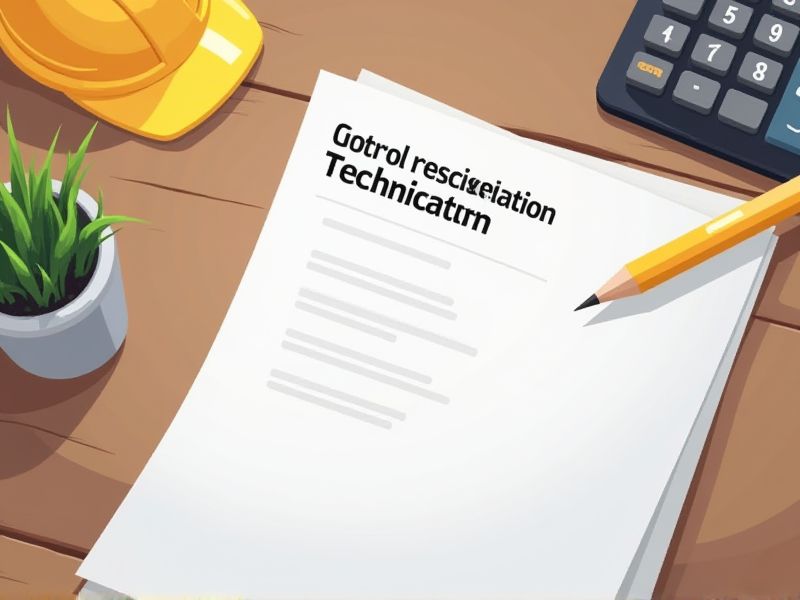
Control and Instrumentation Technicians play a critical role in ensuring the optimal performance of automated systems. Due to the complexity of modern industrial processes, employers often require technicians to possess specialized certifications that validate their skills and knowledge. Certifications ensure that technicians are well-versed in safety protocols, system diagnostics, and precise measurements, reducing the risk of costly errors. Here are key certifications that may be required for a Control and Instrumentation Technician.
ISA Certified Control Systems Technician (CCST)
The ISA Certified Control Systems Technician (CCST) certification is essential as it verifies a technician's competence in managing and troubleshooting complex control systems crucial for industry operation. Earning the CCST credential demonstrates a deep understanding of instrumentation and process control, making technicians more reliable and effective in maintaining system integrity. Companies demand this certification to ensure their staff can minimize downtime and optimize productivity through qualified skillsets. The certification also aligns with industry standards, reducing the risk of errors that could result in costly equipment failures or safety hazards.
ISA Certified Automation Professional (CAP)
The ISA Certified Automation Professional (CAP) credential validates a Control and Instrumentation Technician's expertise in automation, enhancing their credibility in the industry. The certification ensures that the technician possesses up-to-date knowledge about industry standards and best practices. Employers tend to prioritize certified professionals, potentially leading to better job opportunities and career advancements. CAP certification aligns with the growing complexity of automation systems, enabling technicians to effectively manage and troubleshoot modern technology.
OSHA 10-Hour General Industry Certification
Control and Instrumentation Technicians often work in environments with various potential hazards. OSHA 10-Hour General Industry Certification provides essential safety training to identify, avoid, and mitigate risks in workplace settings. This certification ensures that technicians understand their responsibility for maintaining a safe work environment. Employers often require this certification to demonstrate a commitment to safety and compliance with federal safety regulations.
HAZWOPER Certification
HAZWOPER certification ensures a Control and Instrumentation Technician is adequately prepared to handle hazardous waste safely during site operations. It provides necessary training to meet OSHA regulations, thereby reducing workplace accidents and health risks. Employers benefit from reduced liability and insurance costs by having certified personnel. Better career opportunities emerge for technicians with this certification due to compliance with industry safety standards.
PLC Programming Certification
Control and Instrumentation Technicians often work with complex systems, and PLC Programming Certification provides them the skills needed to manage and troubleshoot these systems effectively. Certification ensures that technicians are familiar with industry standards, thereby reducing errors and downtime in industrial operations. Employers often require certification for such roles because it validates the technician's competency and readiness to handle intricate control systems. Having certified technicians can improve overall operational efficiency and safety, leading to cost savings and increased productivity.
SCADA System Programming Certification
The SCADA System Programming Certification provides control and instrumentation technicians with a comprehensive understanding of how to effectively monitor and manage automated processes in industrial environments. Acquiring this certification ensures technicians are equipped with up-to-date skills necessary for integrating and troubleshooting SCADA systems, which are vital for operational efficiency. The certification demonstrates proficiency in industry standards, increasing a technician's employability and potential for career advancement. Certified technicians contribute to enhanced system reliability and safety, reducing the likelihood of costly production downtime.
NFPA 70E Electrical Safety Certification
Control and instrumentation technicians work with complex electrical systems where NFPA 70E certification ensures they understand and adhere to safety protocols, reducing the risk of electrical accidents. NFPA 70E certification provides knowledge on personal protective equipment, which is crucial for technicians working in environments with potential electrical hazards. Compliance with NFPA 70E standards enables companies to mitigate liability risks by ensuring their technicians are properly trained in electrical safety. Employers often require NFPA 70E certification to demonstrate a technician's competence and commitment to maintaining high safety standards in the industry.
Instrumentation Calibration Specialist Certification
Achieving Instrumentation Calibration Specialist Certification enhances a technician's credibility, assuring employers of their competencies and proficiency in calibration. The certification addresses industry standards, reducing errors and improving efficiency in control and instrumentation tasks. As technology advances, certified specialists are better equipped to handle complex systems, which increases job security and career advancement opportunities. Obtaining this certification often results in higher wages, reflecting the enhanced skill set and expertise of certified technicians.
Confined Space Entry Certification
Confined Space Entry Certification is required for Control and Instrumentation Technicians due to the potential presence of hazardous gases and limited oxygen. This certification ensures technicians are trained in safety protocols to prevent accidents in restricted environments. Regulatory compliance often mandates such certifications to ensure workplace safety standards are maintained. Certification also enhances a technician's skills in assessing site-specific risks and implementing emergency procedures efficiently.
Lean Six Sigma Yellow Belt Certification
The Lean Six Sigma Yellow Belt Certification equips Control and Instrumentation Technicians with skills to analyze and improve process efficiency, crucial in minimizing equipment downtime. With these methodologies, technicians can implement process improvements that lead to cost savings and increased production quality. The certification also enhances problem-solving capabilities, enabling effective identification and elimination of process inefficiencies. It provides a structured approach for quality management, which is essential in maintaining system reliability and performance standards.
Summary
When you, as a Control and Instrumentation Technician, obtain certifications, your job prospects can significantly improve. Companies often favor certified professionals, hence increasing your employability and potential salary. Certifications also ensure that you possess updated knowledge and skills, enhancing your efficiency and productivity. Employers may see reduced training costs if you come with accredited qualifications, fostering a more competent workforce.
